Issue: Did the Company Violate the Collective Bargaining Agreement When It Reduced the Hours of Full-Time Employees to Less than 35 Hours per Week
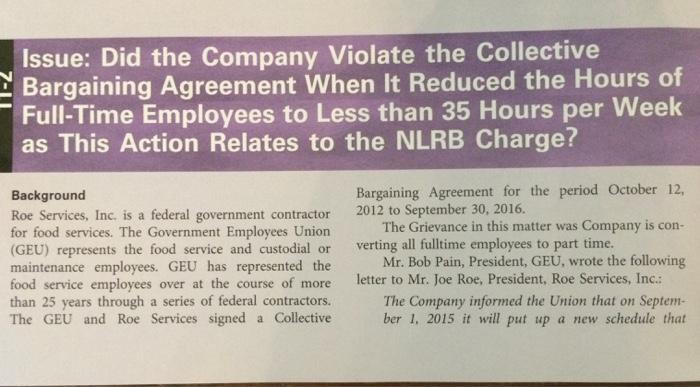
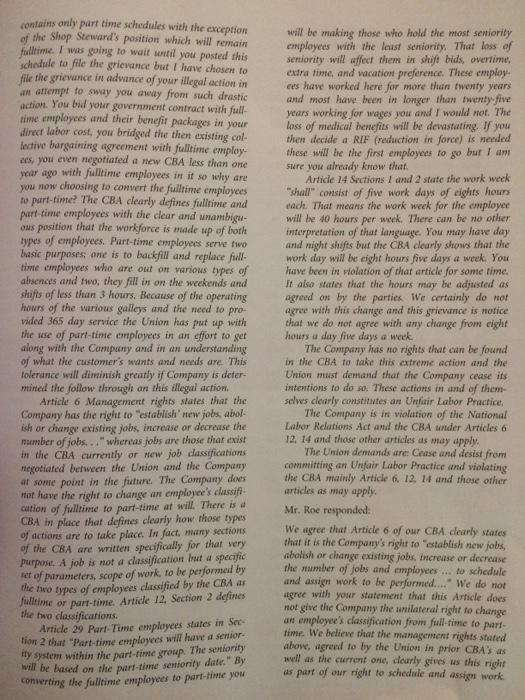
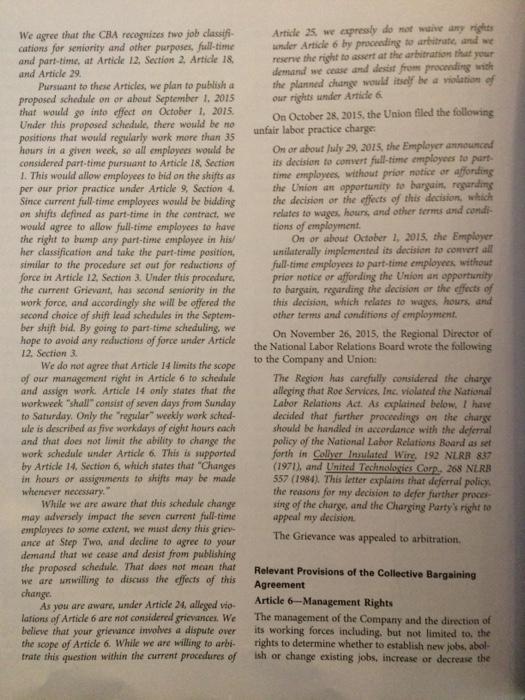
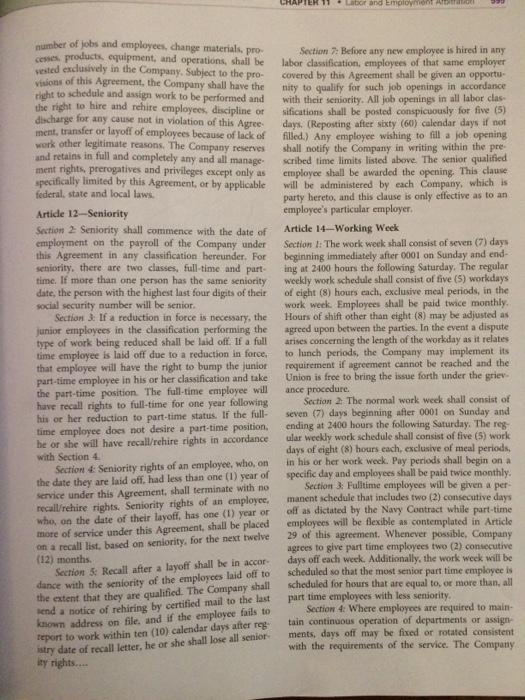
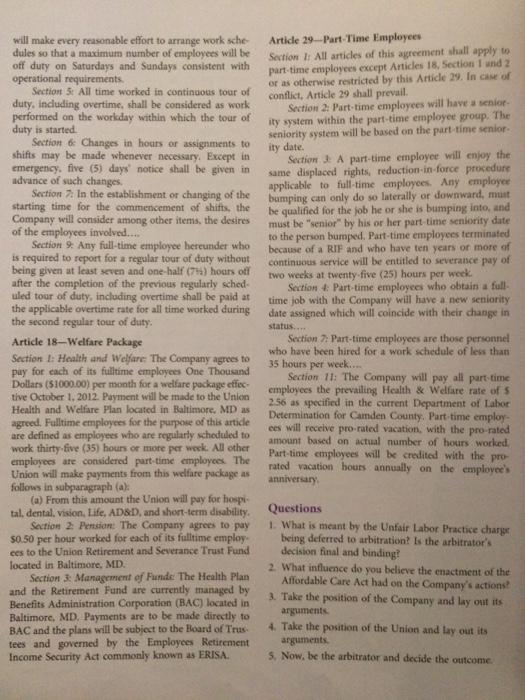
Issue: Did the Company Violate the Collective Bargaining Agreement When It Reduced the Hours of Full-Time Employees to Less than 35 Hours per Week as This Action Relates to the NLRB Charge? Background Bargaining Agreement for the period October 12, 2012 to September 30, 2016. The Grievance in this matter was Company is con- verting all fulltime employees to part time. Roe Services, Inc. is a federal government contractor for food services. The Government Employees Union (GEU) represents the food service and custodial or maintenance employees. GEU has represented the food service employees over at the course of more than 25 years through a series of federal contractors. The GEU and Roe Services signed a Collective Mr. Bob Pain, President, GEU, wrote the following letter to Mr. Joe Roe, President, Roe Services, Inc.: The Company informed the Union that on Septem- ber 1, 2015 it will put up a new schedule that contains only part time schedules with the exception of the Shop Steward's position which will remain fulltime. I was going to wait until you posted this schedule to file the grievance but I have chosen to file the grievance in advance of your illegal action in an attempt to sway you away from such drastic action. You bid your government contract with full- time employees and their benefit packages in your direct labor cost, you bridged the then existing col- lective bargaining agreement with fulltime employ ces, you even negotiated a new CBA less than one year ago with fulltime employees in it so why are you now choosing to convert the fulltime employees to part-time? The CBA clearly defines fulltime and part-time employees with the clear and unambigu- ous position that the workforce is made up of both types of employees. Part-time employees serve two basic purposes; one is to backfill and replace full- time employees who are out on various types of absences and two, they fill in on the weekends and shifts of less than 3 hours. Because of the operating hours of the various galleys and the need to pro- vided 365 day service the Union has put up with the use of part-time employees in an effort to get along with the Company and in an understanding of what the customer's wants and needs are. This tolerance will diminish greatly if Company is deter- mined the follow through on this illegal action. Article 6 Management rights states that the Company has the right to "establish' new jobs, abol- ish or change existing jobs, increase or decrease the number of jobs..." whereas jobs are those that exist in the CBA currently or new job classifications negotiated between the Union and the Company at some point in the future. The Company does not have the right to change an employee's classifi- cation of fulltime to part-time at will. There is a CBA in place that defines clearly how those types of actions are to take place. In fact, many sections of the CBA are written specifically for that very purpose. A job is not a classification but a specific set of parameters, scope of work, to be performed by the two types of employees classified by the CBA as fulltime or part-time. Article 12, Section 2 defines the two classifications. Article 29 Part-Time employees states in Sec- tion 2 that "Part-time employees will have a senior- ity system within the part-time group. The seniority will be based on the part-time seniority date." By converting the fulltime employees to part-time you will be making those who hold the most seniority employees with the least seniority. That loss of seniority will affect them in shift bids, overtime, extra time, and vacation preference. These employ ees have worked here for more than twenty years and most have been in longer than twenty-five years working for wages you and I would not. The loss of medical benefits will be devastating. If you then decide a RIF (reduction in force) is needed these will be the first employees to go but I am sure you already know that. Article 14 Sections 1 and 2 state the work week "shall" consist of five work days of eights hours each. That means the work week for the employee will be 40 hours per week. There can be no other interpretation of that language. You may have day and night shifts but the CBA clearly shows that the work day will be eight hours five days a week. You have been in violation of that article for some time. It also states that the hours may be adjusted as agreed on by the parties. We certainly do not agree with this change and this grievance is notice that we do not agree with any change from eight hours a day five days a week. The Company has no rights that can be found in the CBA to take this extreme action and the Union must demand that the Company cease its intentions to do so. These actions in and of them- selves clearly constitutes an Unfair Labor Practice, The Company is in violation of the National Labor Relations Act and the CBA under Articles 6 12. 14 and those other articles as may apply. The Union demands are: Cease and desist from committing an Unfair Labor Practice and violating the CBA mainly Article 6, 12, 14 and those other articles as may apply. Mr. Roe responded: We agree that Article 6 of our CBA clearly states that it is the Company's right to "establish new jobs, abolish or change existing jobs, increase or decrease the number of jobs and employees... to schedule and assign work to be performed..... We do not agree with your statement that this Article does not give the Company the unilateral right to change an employee's classification from full-time to part- time. We believe that the management rights stated above, agreed to by the Union in prior CBA's as well as the current one, clearly gives us this right as part of our right to schedule and assign work. We that the CBA recognizes two job classifi- agree cations for seniority and other purposes, full-time and part-time, at Article 12, Section 2, Article 18, and Article 29. Pursuant to these Articles, we plan to publish a proposed schedule on or about September 1, 2015 that would go into effect on October 1, 2015. Under this proposed schedule, there would be no positions that would regularly work more than 35 hours in a given week, so all employees would be considered part-time pursuant to Article 18, Section 1. This would allow employees to bid on the shifts as per our prior practice under Article 9, Section 4. Since current full-time employees would be bidding on shifts defined as part-time in the contract, we would agree to allow full-time employees to have the right to bump any part-time employee in his/ her classification and take the part-time position, similar to the procedure set out for reductions of force in Article 12, Section 3. Under this procedure. the current Grievant, has second seniority in the work force, and accordingly she will be offered the second choice of shift lead schedules in the Septem- ber shift bid. By going to part-time scheduling, we hope to avoid any reductions of force under Article 12, Section 3. We do not agree that Article 14 limits the scope of our management right in Article 6 to schedule and assign work. Article 14 only states that the workweek "shall" consist of seven days from Sunday to Saturday. Only the "regular" weekly work sched- ule is described as five workdays of eight hours each and that does not limit the ability to change the work schedule under Article 6. This is supported by Article 14, Section 6, which states that "Changes in hours or assignments to shifts may be made whenever necessary. While we are aware that this schedule change may adversely impact the seven current full-time employees to some extent, we must deny this griev ance at Step Two, and decline to agree to your demand that we cease and desist from publishing the proposed schedule. That does not mean that we are unwilling to discuss the effects of this change. As you are aware, under Article 24, alleged vio- lations of Article 6 are not considered grievances. We believe that your grievance involves a dispute over scope of Article 6. While we are willing to arbi- trate this question within the current procedures of Article 25, we expressly do not waive any rights under Article 6 by proceeding to arbitrate, and we reserve the right to assert at the arbitration that your demand we cease and desist from proceeding with the planned change would itself be a violation of our rights under Article 6 On October 28, 2015, the Union filed the following unfair labor practice charge. On or about July 29, 2015, the Employer announced its decision to convert full-time employees to part- time employees, without prior notice or affording the Union an opportunity to bargain, regarding the decision or the effects of this decision, which relates to wages, hours, and other terms and condi tions of employment. On or about October 1, 2015, the Employer unilaterally implemented its decision to convert all full-time employees to part-time employees, without prior notice or affording the Union an opportunity to bargain, regarding the decision or the effects of this decision, which relates to wages, hours, and other terms and conditions of employment. On November 26, 2015, the Regional Director of the National Labor Relations Board wrote the following to the Company and Union: The Region has carefully considered the charge alleging that Roe Services, Inc. violated the National Labor Relations Act. As explained below, I have decided that further proceedings on the charge should be handled in accordance with the deferral policy of the National Labor Relations Board as set forth in Collver Insulated Wire, 192 NLRB 837 (1971), and United Technologies Corp, 268 NLRB 557 (1984). This letter explains that deferral policy. the reasons for my decision to defer further proces- sing of the charge, and the Charging Party's right to appeal my decision. The Grievance was appealed to arbitration. Relevant Provisions of the Collective Bargaining Agreement Article 6-Management Rights The management of the Company and the direction of its working forces including, but not limited to, the to determine whether to establish new jobs, abol- ish or change existing jobs, increase or decrease the number of jobs and employees, change materials, pro- cesses, products, equipment, and operations, shall be vested exclusively in the Company. Subject to the pro- visions of this Agreement, the Company shall have the right to schedule and assign work to be performed and the right to hire and rehire employees, discipline or discharge for any cause not in violation of this Agree- ment, transfer or layoff of employees because of lack of work other legitimate reasons. The Company reserves and retains in full and completely any and all manage- ment rights, prerogatives and privileges except only as specifically limited by this Agreement, or by applicable federal, state and local laws. Article 12-Seniority Section 2: Seniority shall commence with the date of employment on the payroll of the Company under this Agreement in any classification hereunder. For seniority, there are two classes, full-time and part- time. If more than one person has the same seniority date, the person with the highest last four digits of their social security number will be senior. Section 3: If a reduction in force is necessary, the junior employees in the classification performing the type of work being reduced shall be laid off. If a full time employee is laid off due to a reduction in force. that employee will have the right to bump the junior part-time employee in his or her classification and take the part-time position. The full-time employee will have recall rights to full-time for one year following his or her reduction to part-time status. If the full- time employee does not desire a part-time position. he or she will have recall/rehire rights in accordance with Section 4. Section 4: Seniority rights of an employee, who, on the date they are laid off, had less than one (1) year of service under this Agreement, shall terminate with no recall/rehire rights. Seniority rights of an employee, who, on the date of their layoff, has one (1) year or more of service under this Agreement, shall be placed on a recall list, based on seniority, for the next twelve- (12) months. Section 5: Recall after a layoff shall be in accor- dance with the seniority of the employees laid off to the extent that they are qualified. The Company shall send a notice of rehiring by certified mail to the last known address on file, and if the employee fails to report to work within ten (10) calendar days after reg istry date of recall letter, he or she shall lose all senior- ity rights.... Labor and Employment Arbitration Section 7: Before any new employee is hired in any labor classification, employees of that same employer covered by this Agreement shall be given an opportu- nity to qualify for such job openings in accordance with their seniority. All job openings in all labor clas sifications shall be posted conspicuously for five (5) days. (Reposting after sixty (60) calendar days if not filled.) Any employee wishing to fill a job opening shall notify the Company in writing within the pre- scribed time limits listed above. The senior qualified employee shall be awarded the opening. This clause will be administered by each Company, which is t party hereto, and this clause is only effective as to an employee's particular employer. Article 14-Working Week Section 1: The work week shall consist of seven (7) days beginning immediately after 0001 on Sunday and end- ing at 2400 hours the following Saturday. The regular weekly work schedule shall consist of five (5) workdays of eight (8) hours each, exclusive meal periods, in the work week. Employees shall be paid twice monthly.. Hours of shift other than eight (8) may be adjusted as agreed upon between the parties. In the event a dispute arises concerning the length of the workday as it relates to lunch periods, the Company may implement its requirement if agreement cannot be reached and the i Union is free to bring the issue forth under the griev- ance procedure. Section 2: The normal work week shall consist of seven (7) days beginning after 0001 on Sunday and ending at 2400 hours the following Saturday. The reg ular weekly work schedule shall consist of five (5) work days of eight (8) hours each, exclusive of meal periods, in his or her work week. Pay periods shall begin on a specific day and employees shall be paid twice monthly. Section 3: Fulltime employees will be given a per- manent schedule that includes two (2) consecutive days off as dictated by the Navy Contract while part-time employees will be flexible as contemplated in Article 29 of this agreement. Whenever possible, Company agrees to give part time employees two (2) consecutive days off each week. Additionally, the work week will be scheduled so that the most senior part time employee is scheduled for hours that are equal to, or more than, all part time employees with less seniority. Section 4: Where employees are required to main- tain continuous operation of departments or assign- ments, days off may be fixed or rotated consistent with the requirements of the service. The Company will make every reasonable effort to arrange work sche- dules so that a maximum number of employees will be off duty on Saturdays and Sundays consistent with operational requirements. Section 5: All time worked in continuous tour of duty, including overtime, shall be considered as work performed on the workday within which the tour of duty is started. Section 6 Changes in hours or assignments to shifts may be made whenever necessary. Except in emergency, five (5) days' notice shall be given in advance of such changes. Section 7: In the establishment or changing of the starting time for the commencement of shifts, the Company will consider among other items, the desires of the employees involved.... Section 9: Any full-time employee hereunder who is required to report for a regular tour of duty without being given at least seven and one-half (74) hours off after the completion of the previous regularly sched- uled tour of duty, including overtime shall be paid at the applicable overtime rate for all time worked during the second regular tour of duty. Article 18-Welfare Package Section 1: Health and Welfare The Company agrees to pay for each of its fulltime employees One Thousand Dollars ($1000.00) per month for a welfare package effec- tive October 1, 2012. Payment will be made to the Union Health and Welfare Plan located in Baltimore, MD as agreed. Fulltime employees for the purpose of this article are defined as employees who are regularly scheduled to work thirty-five (35) hours or more per week. All other employees are considered part-time employees. The Union will make payments from this welfare package as follows in subparagraph (a): (a) From this amount the Union will pay for hospi- tal, dental, vision, Life, AD&D, and short-term disability. Section 2: Pension: The Company agrees to pay $0.50 per hour worked for each of its fulltime employ ees to the Union Retirement and Severance Trust Fund located in Baltimore, MD. Section 3: Management of Funde: The Health Plan and the Retirement Fund are currently managed by Benefits Administration Corporation (BAC) located in Baltimore, MD. Payments are to be made directly to BAC and the plans will be subject to the Board of Trus tees and governed by the Employees Retirement Income Security Act commonly known as ERISA. Article 29--Part-Time Employees Section 1: All articles of this agreement shall apply to part-time employees except Articles 18, Section 1 and 2 or as otherwise restricted by this Article 29. In case of conflict, Article 29 shall prevail. Section 2: Part-time employees will have a senior- ity system within the part-time employee group. The seniority system will be based on the part-time senior- ity date. Section 3 A part-time employee will enjoy the same displaced rights, reduction-in-force procedure applicable to full-time employees. Any employee bumping can only do so laterally or downward, must be qualified for the job he or she is bumping into, and must be "senior" by his or her part-time seniority date to the person bumped. Part-time employees terminated because of a RIF and who have ten years or more of continuous service will be entitled to severance pay of two weeks at twenty-five (25) hours per week. Section 4: Part-time employees who obtain a full- time job with the Company will have a new seniority date assigned which will coincide with their change in status.... Section 7: Part-time employees are those personnel who have been hired for a work schedule of less than 35 hours per week..... Section 11: The Company will pay all part-time employees the prevailing Health & Welfare rate of S 2.56 as specified in the current Department of Labor Determination for Camden County. Part-time employ- ces will receive pro-rated vacation, with the pro-rated amount based on actual number of hours worked. Part-time employees will be credited with the pro- rated vacation hours annually on the employee's anniversary. Questions 1. What is meant by the Unfair Labor Practice charge being deferred to arbitration? Is the arbitrator's decision final and binding? 2. What influence do you believe the enactment of the Affordable Care Act had on the Company's actions? 3. Take the position of the Company and lay out its arguments. 4. Take the position of the Union and lay out its arguments. 5. Now, be the arbitrator and decide the outcome.
Step by Step Solution
3.49 Rating (162 Votes )
There are 3 Steps involved in it
Step: 1
The unfair labour practice charge being deferred to arbitrator means that there would be a team of expert panel which would try to mitigate between th...
See step-by-step solutions with expert insights and AI powered tools for academic success
Step: 2

Step: 3

Ace Your Homework with AI
Get the answers you need in no time with our AI-driven, step-by-step assistance
Get Started


